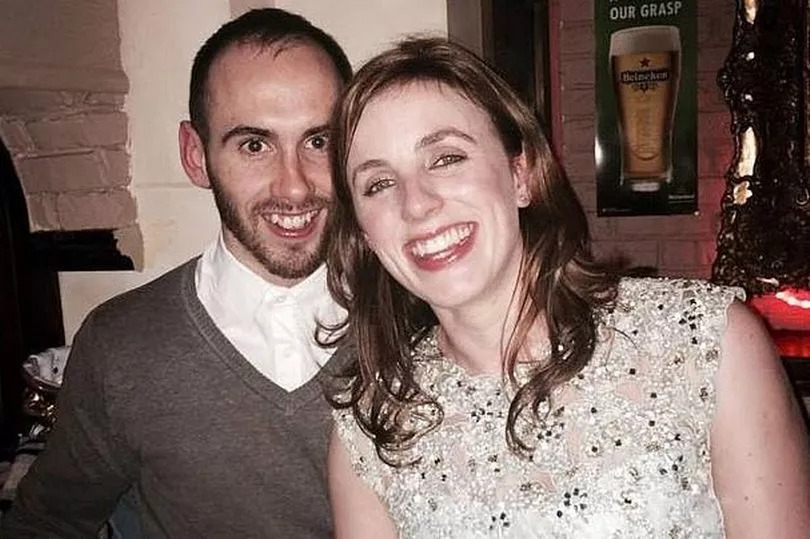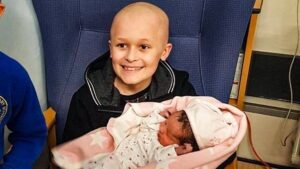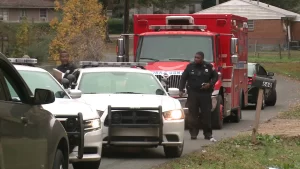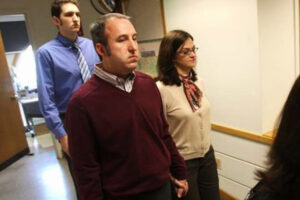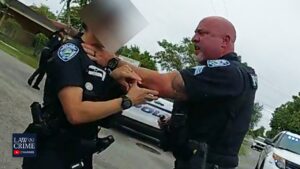In his first interview since an inquest into the death of his wife and son, Darren Coleman described his former partner Nicola as “a really, really ill person, a frightened person, who was screaming for help but not getting the help”
Family collect pic used with permission of family of 34 year old paediatric nurse, Nicola Keane and her husband Darren Coleman ..Picture Colin Keegan, Collins Dublin (Image: Colin Keegan, Collins Agency, Dublin)
A man whose wife took her own life after killing their seven-month-old baby son said that he was told not to leave the pair of them alone after she was diagnosed with severe post-natal depression, but “was never informed as to why”.
In October 2020, Darren’s life changed utterly when his wife Nicola Keane, who was suffering with post-natal depression, killed their baby son Henry. She then left the house where Darren was sleeping and took her own life.
Speaking to Miriam O’Callaghan on RTÉ Radio One’s Sunday With Miriam in a first interview since he settled an action over the care received by his wife and received an apology from the HSE, Darren Coleman said “there will be more tragedies if things don’t change right now” in relation to how women are treated during pregnancy and in the aftermath of giving birth.
Commenting on his late wife’s diagnosis of severe post-natal depression, Darren said: “In Crumlin hospital, Nicola confided in staff there that she was of low mood, that she had no love or bond with Henry… that day, we had our first meeting, on 7 July (2020), with the Community Mental Health team for our region and that’s where she was diagnosed with severe post-natal depression. For me, before that, there was no idea of it.”
“It was an overwhelming day,” he added.
Family collect pic used with permission of family of 34 year old paediatric nurse, Nicola Keane and her husband Darren Coleman (Image: Colin Keegan, Collins Agency, Dublin)
“I wasn’t to leave Nicola alone with Henry, but was never informed as to why. So, this person you’d been together with for 17 years, I had to monitor full time. When they’d have a bath, to increase that bond, I stood at the door and would constantly check on them. If she brought Henry upstairs to change him, I’d follow.”
Speaking about the treatment received by Nicola in the aftermath of the diagnosis, Darren said: “She had stated that she had botched [Henry] in some way. Nicola told the truth. Often, they say people suffering from mental health will hide the illness. She communicated with all her team, very clearly, that she was sick. She was telling them how sick she was, that she needed help.
“And just reiterating again, I’m not here to blame any of the people involved in her care, they did their jobs, they were following certain guidelines and a template – they tried their best. But things need to change in that if you see obviously dangerous tendencies, then the immediate family has to be told.”
Describing the harrowing night of the death of his wife and their son, Darren said: “It was a normal Wednesday for us… We went upstairs at 10.30pm, and as we were going upstairs, I could hear Henry very unsettled… Nicola said, ‘I’ll just take him out to the spare room and walk him there, he’ll settle in a few minutes’.
Darren Coleman, husband of the late Nicola Keane , left with Michelle Keane, sister, and her husband, James McKenzie leaving the Dublin District Coroner’s Court after giving evidence to the joint inquest into the deaths of 34 year old paediatric nurse, Nicola Keane and her 7 month old son, Henry Coleman, who were both found deceased in October 2020 in different locations (Image: Colin Keegan, Collins Agency, Dublin)
“Ten minutes later, I could still hear Henry crying so I went back out and said ‘I’ll take him, you go into bed’ and she said ‘No, you have to work in the morning’ – not in a pushy way, but in a caring way. Next thing I remember was being woken in the middle of the night by knocking at the door and seeing the Garda lights outside… I shouted for Nicola and said ‘the Guards are at the door’ but I just continued downstairs … they said they found [Nicola’s] car and I just said, ‘Where’s Henry?’
“They had a confused look on their heads, so I ran straight upstairs and found Henry. I knew he was dead. I held him. He was floppy in my arms, there was blood under his nose – he was gone at that stage, I knew that. So, I just said goodbye and I brought him downstairs. The guards and the paramedics said they’d do CPR, but I knew he was dead at that stage, I could feel it, there was no life in him.”
Darren said he “couldn’t comprehend what had happened” and that he felt both anger and confusion in the aftermath of the tragedy. Counselling has been a big help, he says.
“It’s allowed me to talk about things I never talked about before,” he said. “Not to see Nicola as this monster, but as a really, really ill person, a frightened person, who was screaming for help but not getting the help.”
“People think they’ll upset you if they ask, but it actually upsets me more when they don’t ask,” he added. I love talking about Henry… I’m not going to break down if they ask me about him – and if I do, I do.”
Commenting on changes that need to be made to improve care for the treatment of women during and post-pregnancy, Darren said: “The first would be that a priority is made that immediate family members … be informed about your loved one’s treatment. Especially when it could affect others – specifically a child. Engagement is key in this – open lines of communication have to be there. It just has to change because there has been more tragedy since. Unfortunately, there will be more tragedies if things don’t change right now.”
“Secondly, I think there has been a lot of good in Ireland – how we have encouraged people to speak about mental health … But that’s not where the problem is in the mental health system. The enormous gap is in the care being given to those that are suffering from depression, or post-natal depression, or psychosis. That’s where the HSE and the Minister for Mental Health, Mary Butler, that’s where they have to prioritise things… it’s how the State is responding to seriously ill people, like Nicola – that’s where the mental health system is broken.”
“One of the key recommendations from the inquest into Nicola and Henry’s case back in September, the jury recommended that there be specialised psychiatric mother-and-baby units set up in Ireland,” Darren added.
“We need these open quickly. In Ireland, we have none. In the UK, they have 22. Why are Irish women being forgotten about and not having the same very, very key, important facilities? Statistics show one in five pregnant women will deal with mental health problems during pregnancy or in the year afterwards. Irish women are being forgotten about.”
